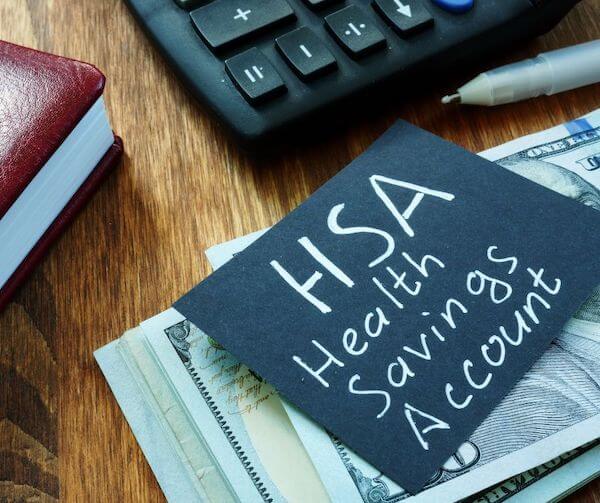Most people have heard of flexible spending accounts that are typically used to pay for healthcare costs like deductibles, copayments, coinsurance, and some drugs, but have you heard about Health Savings Accounts?

Health Savings Accounts are a type of bank account that helps reduce your taxable income and at the same time can save you money on a variety of healthcare expenses.
HSAs were established in 2003 as part of the Medicare Prescription Drug, Improvement and Modernization Act, and have since become a popular option for anyone who wants to manage his or her healthcare costs and is also looking for a tax-advantaged savings tool.

An HSA can save an individual up to $840 per year and a family can save approximately $1,679 per year on taxes.
The money in an HSA rolls over from year to year, providing a kind of rainy-day fund that can be useful for medical expenses, or as a retirement tool to pay for Medicare or other out-of-pocket healthcare expenses.
Who is Eligible?
It is important to understand that you can only enroll in an HSA if you have a high-deductible health plan that is higher than a traditional insurance plan.

Known as HDHPs, the monthly premiums are usually lower, but the out-of-pocket healthcare costs will be higher than most other insurance plans before the insurance company coverage kicks in.
Combining an HDHP membership with a health savings account will allow you to pay for certain medical expenses with the tax-free money that you invest in that HSA.
According to the U.S. Office of Personnel Management, you can open and contribute to an HSA if you meet specific guidelines. They include the following:
- You must not be covered by any other medical plan (such as a spouse’s medical plan)
- You must not be enrolled in Medicare, Tricare or Tricare for Life (for military employees only)
- You cannot be claimed as a dependent on someone else’s tax returns
- You cannot be the recipient of VA medical benefits in the three months prior to joining
- You must not have a flexible spending account or health reimbursement account
How to Set Up An HSA
You can set up an HSA with your bank or credit union. But be aware, like any banking product, there are fees associated with setting up an HSA. It’s wise to shop around before making a final decision.

Once your account is open, you can request a debit card that you can use to pay for qualified medical expenses, such as prescription drugs and prescribed medical tests.
Employers can also contribute to HSAs on your behalf so check with your job beforehand.
The maximum annual contribution that you can make to an HSA has increased in 2023, as per the IRS.
For an individual account holder, the contribution is $3,850 and for families, it is $7,750. If you are 55 and older, you can make an additional $1,000 to that annual contribution.
How Does an HSA Work?
As mentioned before, HSA contributions are tax-deductible. If your employer offers an HSA option, the contributions can easily be deducted from your paycheck.

If you’re self-employed, you could transfer the money from your checking account into your HSA whenever you like or you could make after-tax contributions, which gives you the opportunity to claim a deduction when you file your annual tax returns.
Withdrawals from an HSA are tax-free but only if the money is used for qualifying medical expenses. The IRS provides a long list of such expenses, which are included in its Pub. 502, Medical and Dental Expenses.
Some of those include fees associated with nursing home care, acupuncture treatments, participation in a smoking cessation or weight-loss program, insulin expenses not covered under one’s healthcare plan, payments for dentures, eyeglasses, hearing aids, contact lenses, and much more.
Is An HSA Worth Getting?
Yes, it is, especially if you expect to have any health expenses in the future, and who doesn’t have those at some stage or another?

An HSA also offers several tax benefits, including the fact that you can deduct the contributions from your taxes, plus the interest you earn from an HSA is tax-free, and when you use the money in your HSA for qualified medical expenses, those distributions are also tax-free.
You don’t have to worry about the high deductibles associated with a high-deductible health insurance plan. By creating an HSA, you are creating a trade-off even if you initially incur expensive upfront costs associated with a medical treatment other than preventive care.
It’s good to know that your HSA funds will pay for those high costs, offsetting the potential expense.
Retirement Savings
As mentioned above, you can also save for retirement using your HSA since there is no use-it-or-lose-it condition.

Any money that is in your account at the end of the year remains there to pay for future qualified medical expenses or to squirrel it away for potential health expenses during retirement.
There is one caveat, however. Once you reach 65 and you enroll in Medicare, you can no longer contribute to your HSA, but you can certainly hold on to the funds that you have accumulated.

If you have additional questions about health savings accounts and the tax implications of having an HSA, be sure to reach out to us at [email protected].




